How Alliance number nerds turned single digits into a surge
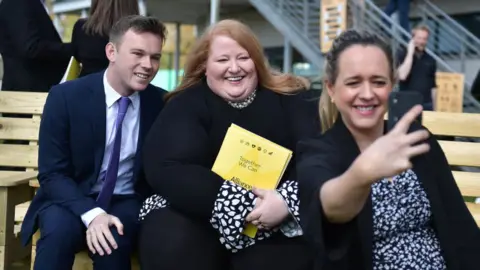 Getty Images
Getty ImagesWhen I first started covering council elections in Northern Ireland in 1989, I realised pretty quickly it would be a good idea to get chatting to the Alliance activists.
The interminable counts involved in proportional representation elections are baffling, but the small middle-of-the-road party seemed replete with more than its fair share of "geeks" - election nerds who could explain to an inexperienced reporter the arcane mysteries of quotas and transfer votes.
In addition, they knew all about the art of tallying - the parallel operation by which party workers note down voters' preferences in order to get a picture of how a contest is going long before the results are officially announced.
Why was Alliance such a repository of psephological wisdom?
Perhaps because - apart from their first council elections in 1973 (when they got nearly 14%) - they never did very well.
The party eked out an existence on single-digit shares of the vote, getting seats only during the final stages of counts, thanks to the scraps thrown from the tables of the major parties.
Alliance volunteers got used to hanging around counts longer than anyone else, developing an expertise on where those scraps might come from.
In first-past-the-post elections, people tended to say Alliance meant well but then pronounced it a "wasted vote".
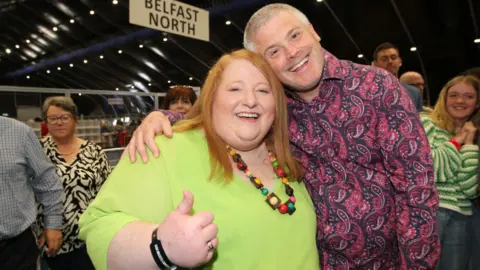 Getty Images
Getty ImagesIn 1996, when an election was held to select negotiators for peace talks, Alliance was well back in fifth place on just 6.5% of the vote.
That's why the eventual deal secured in the Good Friday Agreement treated them as an afterthought.
Unionists and nationalists were given the powerful posts and blocking vetoes, while the "others" in the middle didn't get the same kind of clout over key financial and political decisions.
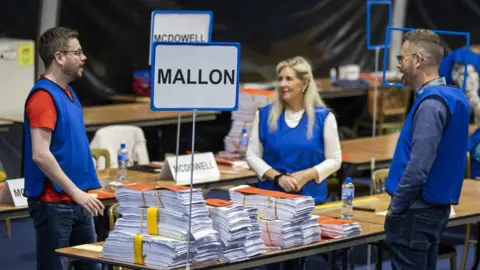 Liam McBurney
Liam McBurneyFast forward to 2022, and it's the brokers of the peace deal, the Ulster Unionist Party (UUP) and the Social Democratic and Labour Party (SDLP), who are bringing up the rear.
Alliance, for so long a "minor" party, is now sitting on 13.5% and through clever vote management has more than doubled its team at Stormont.
So how did this happen?
Long's star power
Alliance actually made its key breakthrough three years ago in the 2019 European, local council and Westminster elections.
The liberal pro-European party capitalised on opposition to Brexit and exasperation over a long period of political paralysis at Stormont.
Naomi Long's 105,928 vote haul in the European election was a testament to the Alliance leader's personal popularity.
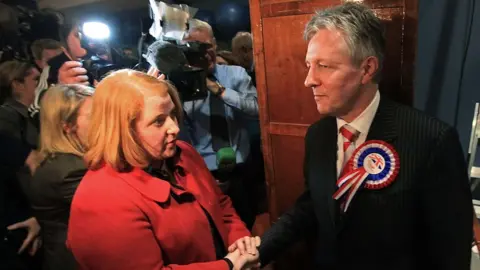 PETER MUHLY/AFP via Getty Images
PETER MUHLY/AFP via Getty ImagesIn 2022, Alliance has repeated a similar trick.
A long-term advocate of building a shared society and making Northern Ireland work, Alliance has benefited from annoyance at the prospect of yet more gridlock at Stormont.
On the protocol, it now acknowledges the need for flexibility but blames Brexit rather than the EU for Northern Ireland's latest ills.
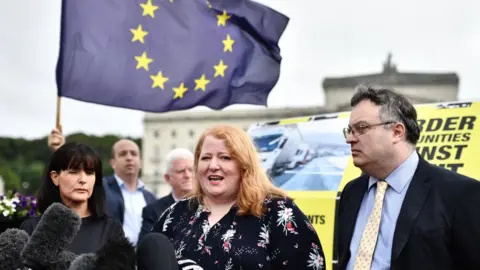 Getty Images
Getty ImagesIn addition Alliance has tapped into the concerns of younger voters more worried about climate change, abortion law reform, tackling domestic violence and securing LGBT rights than wrangling over Northern Ireland's constitutional status.
However, it's worth noting Alliance doesn't have a monopoly on these issues.
The Greens, who tick all the same boxes, just found themselves wiped off the Stormont map.
Could Alliance reform Stormont?
In the forthcoming negotiations, Alliance will argue there's no reason the Stormont executive shouldn't get up and running while issues like the Brexit protocol are dealt with in parallel.
The party will also be looking for an end to Stormont's designation system: the green-orange voting rules which prevent Alliance and other MLAs becoming swing voters in many important matters.
The argument in favour of change might be clear, but Alliance can expect pushback from those parties who enjoy the current safeguards and vetoes.
Despite its elevated status, if Alliance is to reform the Stormont rules it will need to win over the British and Irish governments and build partnerships with some of the other parties.
It might be good for all those politicians to remember that while the current rules don't favour Alliance, the centre-ground constituency the party represents will be key should there be a vote on the Brexit protocol in 2024 and crucial in any future border poll on Irish unity.
Whether they are trying to assemble a coalition for change within the forthcoming talks or preparing for a fresh election in the event of a breakdown, the psephological geeks and nerds of Alliance now have a stronger hand to play.
They won't need reminding of Lyndon B Johnson's famous aphorism that the first rule of politics remains knowing how to count.
